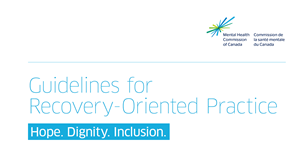 The Mental Health Commission of Canada (MHCC) recently released the Guidelines for Recovery-Oriented Practice. The first of their kind in Canada, the guidelines aim to provide comprehensive information on recovery and recovery principles for mental health professionals, policy and decision makers, all individuals accessing mental health services and their supporters. The release of the guidelines marks the third and final step of the MHCCs’ Recovery Initiative, which included the creation of The Recovery Declaration, a tool to facilitate dialogue, as well as an online inventory of recovery resources. The MHCC defines recovery as an individual’s unique journey to live a satisfying and meaningful life. Each individual has their own needs, goals and approaches to recovery. The guidelines lists 6 dimensions of recovery-oriented practice including:
The Mental Health Commission of Canada (MHCC) recently released the Guidelines for Recovery-Oriented Practice. The first of their kind in Canada, the guidelines aim to provide comprehensive information on recovery and recovery principles for mental health professionals, policy and decision makers, all individuals accessing mental health services and their supporters. The release of the guidelines marks the third and final step of the MHCCs’ Recovery Initiative, which included the creation of The Recovery Declaration, a tool to facilitate dialogue, as well as an online inventory of recovery resources. The MHCC defines recovery as an individual’s unique journey to live a satisfying and meaningful life. Each individual has their own needs, goals and approaches to recovery. The guidelines lists 6 dimensions of recovery-oriented practice including:
- Creating a Culture and Language of Hope, which describes how to promote hope and communicate positive expectations to create services that make individuals feel valued and safe.
- Recovery is Personal, which contains four guidelines that focus on person-first, holistic care that includes affirming autonomy and self-determination, focusing on strengths and building collaborative relationships with individuals and their supporters.
- Recovery Occurs in the Context of One’s Life, which contains four guidelines that include recognize the value of an individual’s social network, the need for social inclusion and social determinants of health advocacy, addressing stigma and discrimination and building community partnerships.
- Responding to the Diverse Needs of Everyone Living in Canada, which contains four guidelines on how to be responsive to diverse needs; across the lifespan for diverse communities, including: immigrants, refugees, ethnocultural and racialized communities and LGBT communities.
- Guidelines for working with First Nations, Inuit and Métis, which describes the Indigenous understanding of wellness and cultural safety and how these learnings can be incorporated into recovery-oriented practice
- Recovery is about Transforming Services, which includes four guidelines on recovery vision, commitment and culture; acknowledging and learning from people’s experiential knowledge; recovery-promoting service partnerships; and workforce development and planning.
For more information and to read the full Guidelines, visit the MHCC website.